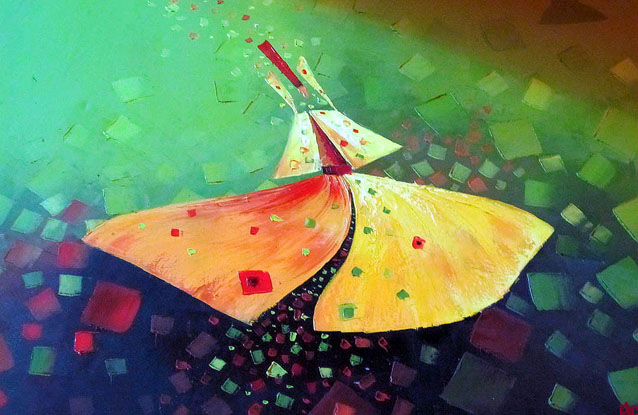
While today we're all thinking about chemical weapons in Syria, I can't stop thinking about the Sufis there--the living and dead mystic masters and dervishes whom I encountered in Damascus just two months before the civil war began.
Though I arrived in Damascus with a Sufi itinerary of sorts--visit this saint, find that shrine--I found myself running into dervishes where I least expected it. For example, while strolling through the chocolate and white striped doorways of the 18th century Azm Palace--which coincidentally was bombed by the French in 1925 during a Syrian uprising against colonial rule--I stumbled upon these statues of whirling dervishes put on display to illustrate how Sufism has long been woven into the spiritual and artistic fabric of Syria.
When most people think of whirling dervishes and the Sufi poet Rumi, they don't think of Syria--but they should. The Mevlevi Sufi Order, which follows in Rumi's footsteps, has been active in Syria for centuries, and still is today--as illustrated in the photo below of a Syrian dervish whirling in a 14th century Mamluk hospital in Aleppo.
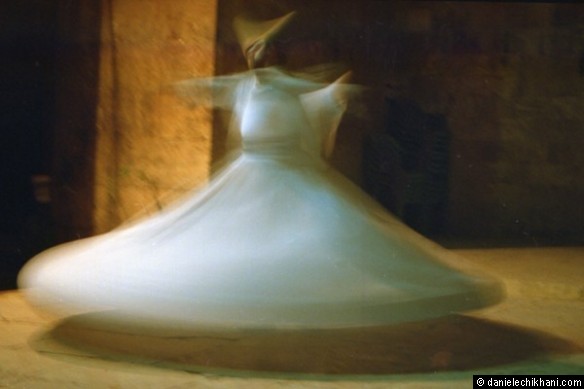
A few years ago, when I had the chance to see Sufis from Damascus whirl at Harvard (dervishes do tend to wander), a few members of the ensemble were missing--since their visas had been denied.
"We are not terrorists," one of the dervishes said into the microphone--after the standing ovation. The audience became as still as soldiers, with many of their heads hung in contemplation--or was it shame?
"We are Sufis, and we have come here for peace--not war," he said. His humble words--delivered from a pleading heart--triggered a wave of applause, unlike any I have ever heard. Deep and defiant--angry but inspired--our applause for peace was so strong that it made the pews tremble, and tears tumble.
I remembered that spirited applause, as I sauntered down the labyrinthine lanes of the Old City in Damascus on my way to visit the Umayyad Mosque--which Pope John Paul II visited in 2001 on the first papal visit to a mosque. In several shops of the souq, I spotted colorful paintings of whirling dervishes for sale. Though they'd been painted to cater to a tourist's taste, it was a delight to see dervishes whirling in all directions, as I circled the mosque along the mighty walls of the Citadel (below).
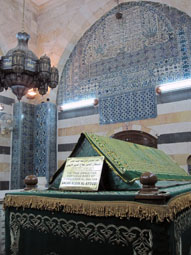
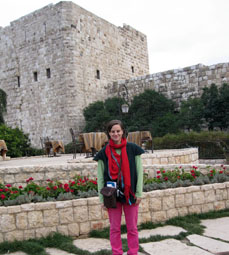
Near the northwest corner of the mosque, I stumbled upon the shrine of Saladin (above)--that legendary 12th century Sultan who not only beat back the Crusaders in the Levant, but also founded Sufi schools and lodges in Egypt. Scholars and Sufis have long debated whether Saladin's chivalry--romanticized in Europe during the Crusades--was influenced by his connection to the Qadiri Sufi Order. It was Saladin, after all, who reportedly sent Richard the Lionheart fruits and other gifts when he heard that he was ill--before they called their historic truce.
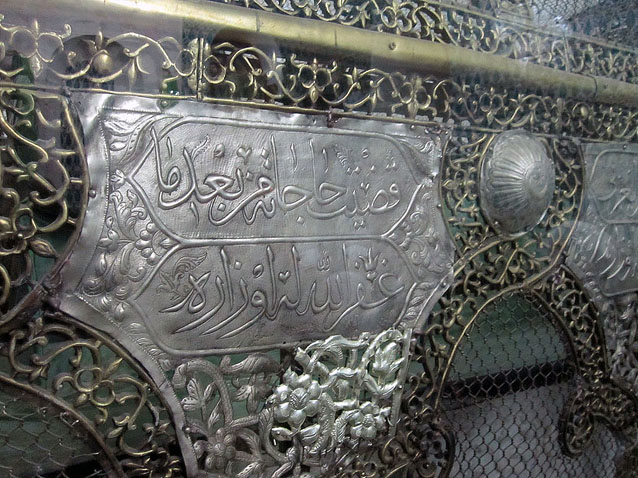
After visiting shrines in and around the mosque, I knew that my visit to Damascus wouldn't be complete without a visit to the tomb of Ibn Arabi (above), the revered 13th century Sufi philosopher from al-Andalus/Islamic Spain--whom many consider Sufism's greatest sheikh.
Sitting next to his grave in his subterranean tomb (below)--packed with devoted Syrian women with their children--I remembered how one of his female Sufi teachers in Spain used to tell him: "I am your divine mother, and the light of your earthly mother."
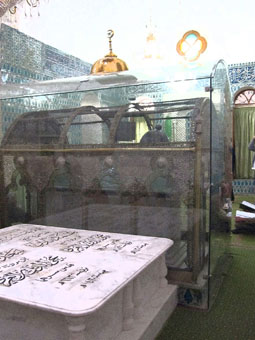 O Marvel! A garden amidst the flames.My heart has become capable of every form:it is a pasture for gazelles and a convent for Christian monks,and a temple for idols and the pilgrim's Kaa'ba,and the tables of the Torah and the book of the Quran.I follow the religion of Love:whatever way Love's camels take,that is my religion and my faith.
O Marvel! A garden amidst the flames.My heart has become capable of every form:it is a pasture for gazelles and a convent for Christian monks,and a temple for idols and the pilgrim's Kaa'ba,and the tables of the Torah and the book of the Quran.I follow the religion of Love:whatever way Love's camels take,that is my religion and my faith.
-- Ibn Arabi
Today, the tradition of female Sufi teachers is still alive in Syria--and I was very fortunate to meet with one of them while I was there. Over lunch next to the Citadel, she told me that she hasn't seen her own Sufi teacher for years--no one has--because he's been in a deep and secluded retreat.
"Don't you miss seeing him?" I asked.
"How could I miss him, when he's always right here in my heart? He taught me everything I needed to learn, and now it's up to me to put it into practice," she said.
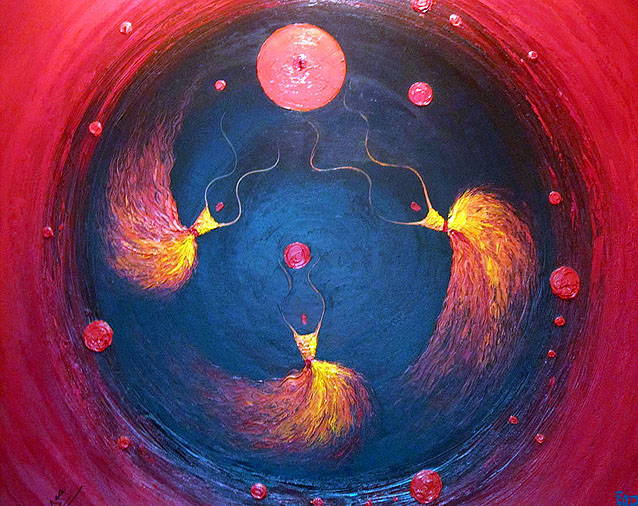
Your Holiness, today we live in a different world. We are likened to the dwellers of one house where each one lives in his or her room. We gather around one screen through which we view the whole world at the same time.
-- Grand Mufti Ahmad Kuftaro in his letter to Pope John Paul II
Wandering through the streets of a conservative neighborhood later that night, I came across the tomb of Sheikh Ahmad Kuftaro (d. 2004)--the former Grand Mufti of Damascus who was also the head of the Naqshbandi Sufi Order in Syria. I recognized his name because I remembered a dear friend of mine from Chicago telling me she had met him in the same year that Pope John Paul II did too--when Sheikh Kuftaro told her that "faith is like an olive tree that needs to be tended--so take your time." Once, when Sheikh Kuftaro was asked by a foreign ambassador about the number of Christians in Syria, he replied that all of the people in Syria are Christian, because a Muslim must believe in Christ and his message.
I see myself as the grand mufti of all 23 million Syrians, not just Muslims, but also Christians and even atheists. I am a man of dialogue. Who knows, maybe an agnostic will convince me with better arguments one day, and I'll become a non-believer.
-- Grand Mufti Ahmad Hassoun
Sheikh Kuftaro's successor, the current Grand Mufti Ahmad Badreddin Hassoun, is also known for his Sufi-inspired statements--which sometimes read like a zen koan: "I am Sunni in practice, a Shiite in allegiance. My roots are Salafi, and my purity is Sufi." He has been no stranger to violence, since his his 22 year-old son was assassinated, and he's been criticized by other Sufi sheikhs and jurists--like Muhammad al-Yaqoubi (@Shaykhabulhuda)--for supporting President Assad. Like any group, Sufis in Syria are falling on all sides of the current divide.
Forget the world, and so command the world.
Be a lamp, or a lifeboat, or a ladder.Help someone's soul heal.
Walk out of your house like a shepherd.Stay in the spiritual fire.
Let it cook you.Be well-baked loaf, and lord of the table.
Come, and be servedto your brothers.--Rumi
Though this minute many Syrians are fleeing Damascus to escape the anticipated foreign military strike, Damascus is filled with a number of historic buildings to which people used to flee for refuge and peace. While snapping the photo above at Tekkiye Suleymaniye--a medieval Sufi school for whirling dervishes--I tried imagining what life had been like for the secluded Sufis who slept in those Ottoman stone cells, and worked in the soup kitchen and hospice across the courtyard--since serving those in need has always been a hallmark of the Sufis.
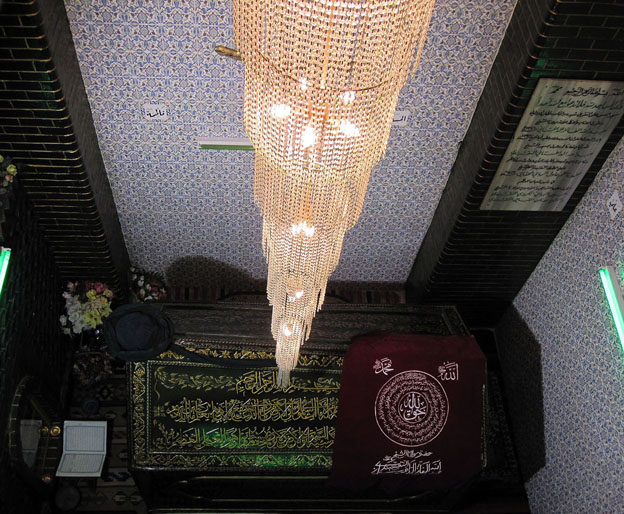
What was unveiled to me of experiences and visions cannot be expressed in words. When I entered the seclusion I said to my ego, 'O my ego, even if I am going to die, I am not going to leave this seclusion. You must know that. Do not try to change my mind or to cheat me.' -- Sheikh Abdullah Fa'izi ad-Daghestani (d. 1973)
I ended my stay in Syria in the shrine of Sheikh ad-Daghestani (above), where it was so dark and peaceful that I fell asleep--turning my visit into an instant overnight retreat. Sheikh ad-Daghestani--who endured a five year retreat as a teenager in a cave on a snow-capped mountain, was a master of what he called the five stations of the heart: the heart itself, the secret, the secret of the secret, the hidden, and the most hidden.
In his understanding, "the (first) stage of the Heart is under the authority of the Prophet Adam, because it represents the physical aspect of the heart. The station of the Secret, is under the Prophet Noah, because it is the Vessel which is saved from the Ocean of Darkness, salvation from the flood of ignorance. The station of the Secret of the Secret, is under two Prophets: Abraham and Moses, who represent God's Divine Presence on Earth." As for the Hidden Station, it is under the jurisdiction of Jesus, because of his special relationship to hidden knowledge and spiritual understanding. And the Most Hidden station of the heart, ad-Daghestani explained, is presided over by the Prophet Muhammad, because he is the one "who was raised up, on the Night of Ascension to the Divine Presence."
As all of these examples show--there's so much more to Syria than just war and the images we are seeing today in the news. There is an abundance of knowledge for us to learn and ponder from the country's rich and complex history.
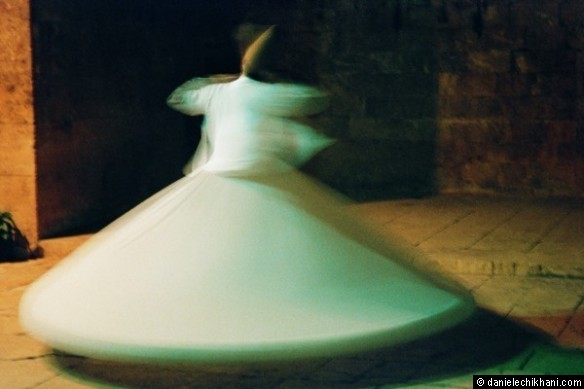
Let us stretch the hands of brotherhood and cooperation instead of the hands of aggression and killing, and let us offer humanity love and peace instead of hatred and bloodshed.
-- Sheikh Kuftaro in his letter to the Pope
One night earlier this year, when I was teaching a whirling workshop in Beirut, an older woman draped in black from head to toe walked with difficulty through the door--whom none of us had ever seen before.
"Are you here for the whirling?" I asked.
"Yes--I am from Syria," she said, "and I am a Sufi."
As we greeted her, she began to share--through tired tears--how she had fled the violence next door two months before. A dedicated dervish for decades, she didn't wipe away her tears--and smile with relief--until she explained how she had been unable to find any Sufis in Lebanon--until that night.
Though she was older than all of us by decades, and had problems with her knees, when the reed flute started to whisper and the Sufi drums began to beat, she surprised us all by taking flight. Whirling with the speed, wonder, and open heart of a child--she seemed like she didn't have a care in the world--like she was living only for love--despite all of the unspeakable horrors she had seen.
